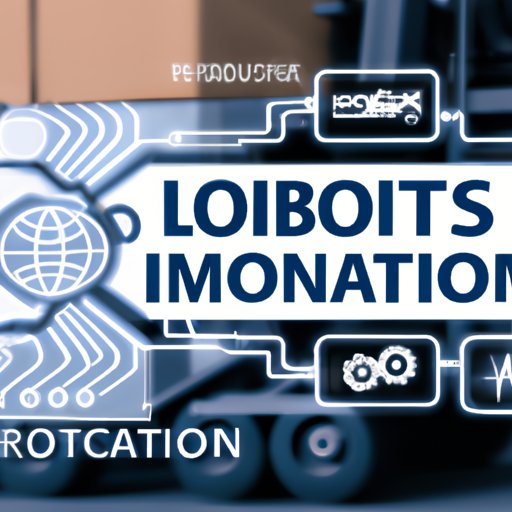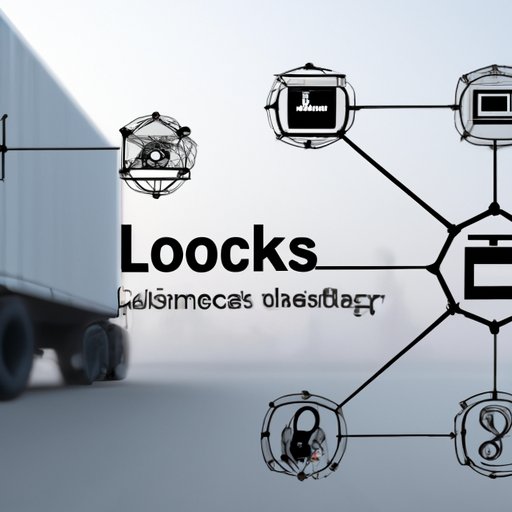Introduction
Logistics refers to the management of goods and services throughout the supply chain from production to consumption. The goal of logistics is to ensure that products and services are delivered in a timely and cost-effective manner. In recent years, technology has been playing an increasingly important role in the logistics industry. This article will explore how technology is changing the future of logistics.
Examining the Impact of Technology on Logistics Management
Technology has had a significant impact on the way logistics is managed. Automation, big data, artificial intelligence (AI), blockchain, and the Internet of Things (IoT) have all changed the way logistics operations are conducted. Let’s take a look at each of these technologies in turn.
Automation
Automation is the use of technology to automate manual processes. Automation can be used to streamline operations, reduce costs, and improve accuracy. Automation is becoming increasingly common in logistics operations, with many companies investing in automated systems to manage their supply chains.
Big Data
Big data is the collection, storage, and analysis of large amounts of data. Big data can be used to gain insight into customer behavior, optimize operations, and make better decisions. In the logistics industry, big data can be used to track shipments, analyze trends, and improve customer service.
Artificial Intelligence
AI is the use of computer algorithms to simulate human intelligence. AI is being used in the logistics industry to automate decision making, predict outcomes, and optimize operations. For example, AI can be used to determine the most efficient route for a delivery or to identify potential problems with a shipment.
Blockchain
Blockchain technology is a distributed ledger system that securely stores and records data. Blockchain is being used in the logistics industry to create secure transactions, improve traceability, and enhance data sharing. By using blockchain, companies can ensure the accuracy and security of their supply chain data.
IoT
The Internet of Things (IoT) is a network of connected devices that can collect and share data. In the logistics industry, IoT can be used to track shipments in real-time, automate monitoring, and streamline operations. By leveraging the power of IoT, companies can gain greater visibility into their supply chains.

Exploring the Benefits of Automation in Logistics
Automation can provide numerous benefits to the logistics industry. Here are some of the ways automation can improve operations:
Increased Efficiency
Automation can help to increase efficiency by eliminating manual processes and streamlining operations. Automated systems can also help to reduce errors and reduce turnaround times. This can help companies to save time and money while improving customer satisfaction.
Reduced Costs
Automation can help to reduce costs by eliminating manual labor and reducing overhead expenses. Automation can also help to reduce errors, which can lead to fewer returns and less wasted product.
Improved Accuracy
Automation can help to improve accuracy by eliminating the need for manual data entry. Automated systems can also help to reduce errors and ensure that shipments arrive on time and in the correct condition.

Analyzing How Big Data is Transforming Logistics
Big data is transforming the way logistics operations are managed. Here are some of the ways big data can improve logistics operations:
Gathering and Analysing Data
Big data can be used to gather and analyse data from various sources. This data can then be used to gain insights into customer behaviour, optimize operations, and make better decisions.
Enhancing Business Decisions
By analysing data, companies can identify patterns and trends that can be used to inform business decisions. This can help companies to make more informed decisions about pricing, inventory management, and customer service.
Improving Customer Service
Big data can be used to identify customer preferences and tailor services to meet their needs. By understanding customer behaviour, companies can provide more personalized services and improve customer satisfaction.
Investigating the Role of AI in Optimizing Logistics
AI is becoming increasingly important in the logistics industry. Here are some of the ways AI can be used to optimize logistics operations:
Predictive Analysis
AI can be used to predict outcomes and identify potential problems. This can help companies to anticipate issues before they arise and take proactive measures to address them.
Automated Decision Making
AI can be used to automate decision making. This can help to reduce errors, speed up processes, and reduce costs.
Improved Planning and Scheduling
AI can be used to improve planning and scheduling. By leveraging AI, companies can optimize routes and schedules to ensure shipments arrive on time and in the correct condition.

Evaluating the Potential of Blockchain for Logistics
Blockchain technology can offer numerous benefits to the logistics industry. Here are some of the ways blockchain can improve operations:
Secure Transactions
Blockchain can be used to create secure transactions. By using blockchain, companies can ensure that their data is secure and tamper-proof.
Improved Traceability
Blockchain can be used to improve traceability. By using blockchain, companies can track and trace shipments in real-time, enabling them to detect and address potential issues quickly.
Enhanced Data Sharing
Blockchain can also be used to facilitate data sharing between different parties in the supply chain. This can help to improve collaboration and ensure seamless operations.
Assessing the Use of IoT for Supply Chain Visibility
The Internet of Things (IoT) can be used to improve supply chain visibility. Here are some of the ways IoT can help to improve visibility:
Real-Time Tracking
IoT can be used to track shipments in real-time. This can help companies to monitor shipments, detect delays, and take corrective action quickly.
Automated Monitoring
IoT can also be used to automate monitoring. Automated monitoring can help to reduce manual labor, improve accuracy, and reduce costs.
Streamlined Operations
IoT can help to streamline operations by providing real-time data that can be used to optimize routes and schedules. This can help to reduce delays and improve customer satisfaction.
Conclusion
Technology is playing an increasingly important role in the logistics industry. Automation, big data, AI, blockchain, and IoT are all transforming the way logistics operations are conducted. These technologies can help to increase efficiency, reduce costs, and improve accuracy. By leveraging the power of technology, companies can gain greater visibility into their supply chains and ensure seamless operations.
In conclusion, technology has the potential to revolutionize the logistics industry. By implementing these technologies, companies can improve their operations and better serve their customers. Further research is needed to explore the full potential of these technologies and understand how they can be used to optimize logistics operations.
(Note: Is this article not meeting your expectations? Do you have knowledge or insights to share? Unlock new opportunities and expand your reach by joining our authors team. Click Registration to join us and share your expertise with our readers.)
